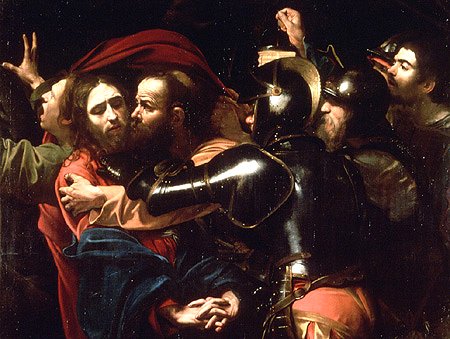 You thought I was going to castigate The New Yorker again, didn't you? Wrong. As I mentioned when I disagreed with Paul Rudnick's piece on nuns, I usually love TNY. Viz: this week's issue has a top-flight piece by Joan Acocella (who wrote on the best articles I've ever read on Willa Cather, called "Willa Cather and the Academy," later turned into a book).
You thought I was going to castigate The New Yorker again, didn't you? Wrong. As I mentioned when I disagreed with Paul Rudnick's piece on nuns, I usually love TNY. Viz: this week's issue has a top-flight piece by Joan Acocella (who wrote on the best articles I've ever read on Willa Cather, called "Willa Cather and the Academy," later turned into a book).
Her latest article reviews several new and newish books on Judas Iscariot and what might be called his "rehabilitation." A few years ago I was asked to serve as a "theological consultant' to a new play called "The Last Days of Judas Iscariot," about whether or not Jesus's betrayer deserved his fate. (Afterwards I wrote a book called "A Jesuit Off-Broadway" about the experience and the subject material.) That's a long and linked way of saying that I'm naturally interested in the same question that Acocella poses: Should we hate Judas? Acocella affords special attention to the "newly discovered" Gospel of Judas," and has this delicious graf on the reaction of some scholars, who discovered therein a more "tolerant" approach to the betrayer:
"That implicit endorsement of tolerance was probably what American scholars valued most in the Judas gospel, but the discovery gave them something else as well: righteous glee. What a joy to have an ancient document in which the man singled out in the Bible as Christianity’s foremost enemy turns out, arguably, to be Christ’s best friend. Hooray! The higher-ups don’t know everything! This was also the appeal of the new gospel to the political left. For people who claimed that the world was ruled by groups that controlled by marginalizing other groups, the Gospel of Judas was like a keystone being hammered into place. Men had silenced women, colonialists had silenced the colonized, and now we saw the Christian Church establishing itself by silencing other Christian voices." The whole piece is here. For another look at the Gospel here's a piece from The Boston Globe.
Okay, enough Judasiana for now. Overall, I'm not sure I agree with Acocella's conclusion, exactly, but it's a terrific article and showcases the writer's astonishing great range. Also in this issue is Nicholas Baker's smackdown of the new Kindle 2, also reviewed in our pages by Carolyn Buscarino somewhat more favorably.
One more thing: the portrait of Judas used ("The Taking of Christ," above), currently in the National Gallery in Dublin, was found in a Jesuit community, in a dining room. The Jesuits of Ireland placed it on permanent loan in the museum.








Only the Lord knows his fate for sure.